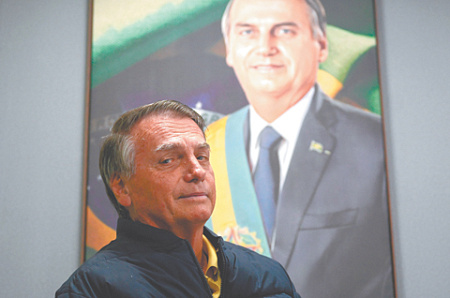
Relations between the United States and Brazil are rapidly deteriorating, teetering on the edge of a major diplomatic and economic crisis. The conflict stems from a US pressure campaign aimed at halting the prosecution of former Brazilian President Jair Bolsonaro, a prominent ally of Donald Trump, who faces accusations of plotting a coup in his home country. In response to the investigation, the White House has accused Brazilian authorities of a “witch hunt” and escalated its political and economic coercion, prompting a defiant backlash from Brasília.
Bolsonaro, who led Brazil from 2019 to 2022, is accused by the nation’s Supreme Court of orchestrating a conspiracy alongside seven others, including a former defense minister, to overturn the 2022 election results and prevent his successor, Luiz Inácio Lula da Silva, from taking office. The former president, who denies the charges, faces a potential prison sentence of up to 43 years. Citing flight risk, authorities have already placed Bolsonaro under an electronic monitoring order, fitting him with an ankle bracelet to track his location.
The American response has been sharp and targeted. In a move to shield his ally, Secretary of State Marco Rubio ordered the cancellation of U.S. visas for eight Brazilian Supreme Court justices involved in the case, including Chief Justice Alexandre de Moraes, as well as their family members. The Trump administration has officially framed the legal proceedings against Bolsonaro as a politically motivated “witch hunt” designed to silence an opponent.
Washington has backed its political maneuvers with significant economic threats. Earlier this month, the White House announced its intention to impose a staggering 50% tariff on all Brazilian goods starting August 1st. This represents a dramatic escalation from a previously planned 10% tariff, signaling a clear intent to force Brazil’s hand. However, the move appears to have backfired, leading only to a hardening of Brazil’s stance and a further tightening of judicial oversight on Bolsonaro.
President Lula’s government has refused to yield to the pressure, framing the issue as a defense of national sovereignty. “Interference in another country’s justice system is unacceptable and offends the basic principles of national sovereignty and respect between nations,” Lula stated on July 19th, vowing to protect the “democratic rule of law.” In a direct counter-move, Lula signed a decree that would allow Brazil to suspend U.S. investment projects and intellectual property rights if the tariffs are implemented. Brasília is also reportedly considering measures to complicate the repatriation of profits for American companies and require them to hold more capital within Brazil.
Despite the heated rhetoric, a complete rupture in diplomatic relations remains unlikely, according to Viktor Kheyfets, Director of the Center for Ibero-American Studies at St. Petersburg State University. He suggests Trump’s strategy reflects his business background: apply extreme pressure to force concessions and then declare victory. Kheyfets noted that the Trump administration is now more willing to “brazenly pressure” foreign governments to align with American expectations, particularly when it involves ideological allies.
As the standoff continues, Brazil appears resolute, with President Lula’s firm stance reportedly boosting his approval ratings, especially among a middle class sensitive to foreign intervention. While Brasília is proceeding with caution to avoid damaging its own investment climate, its willingness to consider such radical countermeasures marks a significant moment for the region’s largest economy. The crucial question remains how far the Trump administration is willing to go to protect its ally and whether a compromise can be reached, perhaps not on the legal case itself, but on the looming trade war.
